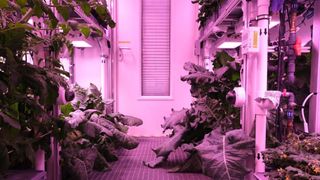Moon agriculture- “A Martian greenhouse in Antarctica produces the best arugula, according to a NASA scientist.“
The following written content by Tereza Pultarova

A team of scientists overwintering at a remote station in Antarctica has harvested crops grown in a high-tech greenhouse designed to test technologies that could one day feed explorers on the moon and Mars.
The greenhouse, called EDEN ISS, is run by the German Aerospace Centre (DLR), which cooperates with NASA on space agriculture research. Currently in its fourth season, the greenhouse grows plants aeroponically, which means that the roots of the plants are suspended in air; nutrients and water are delivered in the form of a specially formulated mist, without the presence of soil.
The greenhouse is part of the Neumayer Station III, an Antarctic research station operated by Germany’s Alfred Wegener Institute of the Helmholtz Centre for Polar and Marine Research in Bremerhaven.

Every day, NASA botanist Jess Bunchek, one of the 10 crew members of the current 14-month mission, has to venture out 1,300 feet (400 meters) to the 40-foot (12 m) container to check on the crops.
During a joint DLR/NASA news conference held on Tuesday (May 4), Bunchek connected right from the greenhouse, admitting that the trek might not always be pleasant. With temperatures plunging as low as minus 58 degrees Fahrenheit (minus 50 degrees Celsius), winds that often match those of a hurricane, and frequent whiteouts, the greenhouse keeper sometimes only has a handrail to guide her to her workplace.
However, Bunchek said, the work pays off: Both eating fresh vegetables and being in the presence of green plants have an enormously uplifting effect on the isolated explorers.
“I have been here for a few months and I can say that this is the favorite part of my day. I find that my energy gets lifted up in here,” Bunchek reported from the greenhouse. “We don’t have a lot of stimulation for the senses: no trees, no greenery. In fact, our day length right now is heavily decreasing. Being here for over a year, we go through a lot of sensory deprivation.”
As close to Mars as one can get
DLR chose to locate the experimental module at the Neumayer Station exactly because of the unforgiving environment, which is as close as one can get to lunar or Martian conditions on Earth, Daniel Schubert, EDEN ISS project leader at the DLR Institute of Space Systems in Bremen, said during the same news conference. Read more from Space.





